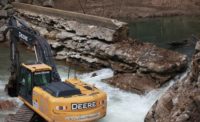"We are looking in a total way at the infrastructure and working with the ministry to get them back to prewar production capability," says Steven Wright, a spokesman for the Corps' Kuwait-based Restore Iraqi Oil Task Force. Until recently, the participating organizations have focused on discrete aspects of the problem, trying to manage their part of an industry in crisis. The July 6-9 meeting gave participants a chance to set priorities.
The essential elements for hitting prewar production capacity are pipeline restoration, maintaining steady filtered-water supplies needed to reinject into Iraqi oil wells, electricity and security against the looting and sabotage that is being witnessed throughout the country, explains Wright.
Limitations in pipeline capacity are a principal factor in the industry's recovery. Maj. Joseph Hanus, the Corps' northern area deputy engineer for Iraq, notes, "We have a pipeline from Kirkuk to Baiji, which is fairly old and corroded. It has a limited capacity of 500,000 bbl/day. So you can see already there are restricting factors." That pipeline is a key segment in the Iraq-Turkey pipeline by which oil from the north is exported (ENR 6/16 p. 18). The Southern Oil Co. productioncurrently standing at 300,000 to 400,000 bbl/dayis limited by storage, power supply and a shortage of filtered water.
|
Johnny Rozsypal, the Corps' southern area engineer for Iraq, says that production "could increase" with more sufficient storage and additional loading of crude onto tankers. "They are also waiting for tankers," says Rozsypal. "Production could rise to 500,000 to 800,000 bbl/day if these issues are resolved."
Rozsypal also points to the Qarmat Ali water pumping station as another priority for restoring prewar production capacities. Before the war, the water station supplied filtered water for reinjection into Iraqi oil wells in the south. "We need filtered water to improve the grade of the crude," he says. "We are trying to get more water for the injection process."
Security problems including sabotage, looting, and the deliberate destruction of electricity grids also have hindered efforts to facilitate Iraq's prewar oil production capacity.
Clifford G. Mumm, Bechtel National Inc.'s project director overseeing the $680-million U.S. Agency for International Development rebuilding contract in Iraq, agrees that looting and other security concerns have hindered work. When Bechtel crews first surveyed the 400-kv power transmission line that runs south into Baghdad there were 13 towers down. Now, 65 towers are down, Mumm said July 15 in an interview with ENR in Washington, D.C. Looters are "harvesting the copper" that they strip from the lines.
Mumm notes that Bechtel finished the assessment portion of its work and submitted an implementation plan in late June to USAID and military officials in Baghdad. After review, specific reconstruction priorities and scope of work will be decided, likely within the next few weeks. Emergency work at Umm Qasr seaport is expected to be completed in August.
![]() To read interview with Cliff Mumm, click here.
To read interview with Cliff Mumm, click here.



Post a comment to this article
Report Abusive Comment